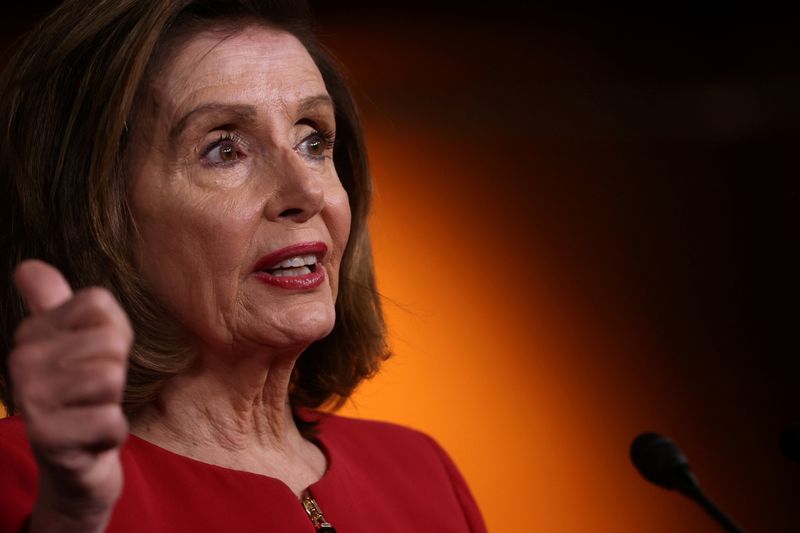By Guy Faulconbridge and Costas Pitas
LONDON (Reuters) - U.S. House of Representatives Speaker Nancy Pelosi cautioned Britain on Friday that there could be no post-Brexit trade deal with the United States if the Northern Ireland peace agreement was destroyed.
The United States has expressed grave concern that a row between London and Brussels over the implementation of the 2020 Brexit treaty could undermine the Good Friday accord, which effectively ended three decades of violence.
"If there is destruction of the Good Friday accords, they (are) very unlikely to have a UK-U.S. bilateral," she told a Chatham House event.
Since the United Kingdom left the European Union on Jan. 1, Johnson has unilaterally delayed the implementation of some provisions of the deal's Northern Ireland Protocol and his top negotiator has said the protocol is unsustainable.
The 1998 peace deal largely brought an end to the "Troubles" - three decades of conflict between Irish Catholic nationalist militants and pro-British Protestant "loyalist" paramilitaries in which 3,600 people were killed.
The British-run region remains deeply split along sectarian lines 23 years after the peace deal brokered by the United States.
Many Catholic nationalists aspire to unification with Ireland while Protestant unionists want to stay part of the United Kingdom.
The Northern Ireland Protocol aims to keep the province, which borders EU member Ireland, in both the United Kingdom's customs territory and the EU's single market.
The EU wants to protect its single market, but an effective border in the Irish Sea created by the protocol cuts off Northern Ireland from the rest of the United Kingdom - to the fury of Protestant unionists.
Some unionists say the protocol contravenes the 1998 peace deal.
CAPITALISM IN USA
Pelosi also said that capitalism has not served the U.S. economy as well as it could have.
"In America, capitalism is our system, it is our economic system, but it has not served our economy as well as it should," she said.
The country needed to improve the system and a strong middle class was a key part of a strong democracy, she said.
"You cannot have a system where the success of some springs from the exploitation of the workers and springs from the exploitation of the environment and the rest, and we have to correct that," she said.
The U.S. economic model had shifted away from "stakeholder capitalism" of the 1980s where productivity increases benefited executives and worker pay.

Pelosi said there was a growing awareness that "we have to do better" and that shareholder capitalism had led to CEO pay soaring but worker pay stagnating.
"That's just not right," Pelosi said.